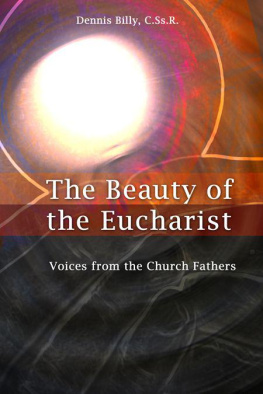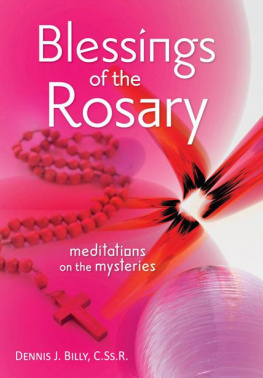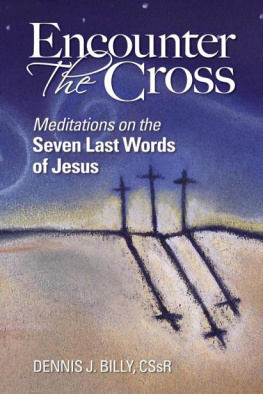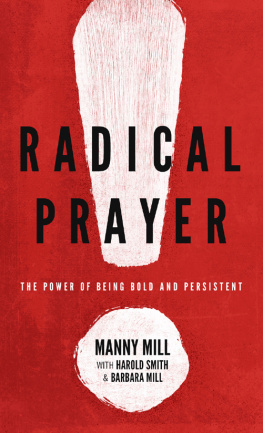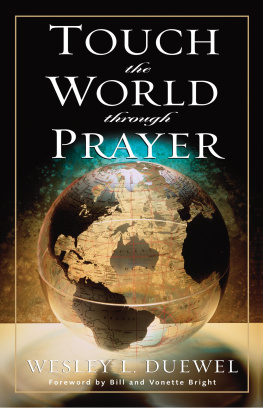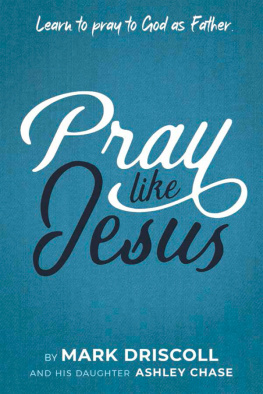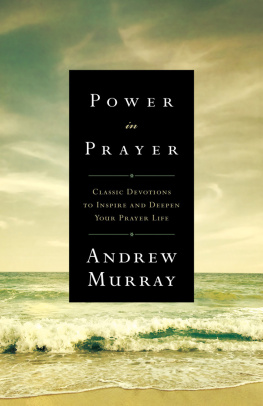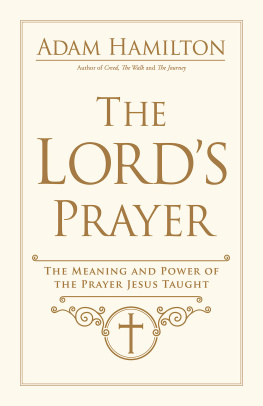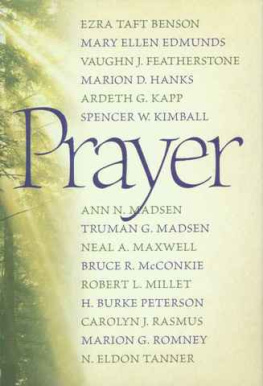The Our Father
A Prayers Power
to Touch Hearts
Dennis J. Billy, CSsR

Imprimi Potest: Harry Grile, CSsR, Provincial
Denver Province, The Redemptorists
Published by Liguori Publications, Liguori, Missouri 63057
To order, call 800-325-9521
www.liguori.org
Copyright 2012 Dennis J. Billy, CSsR
All rights reserved. No part of this publication may be reproduced, stored in a retrieval system, or transmitted in any form or by any meanselectronic, mechanical, photocopy, recording, or any otherexcept for brief quotations in printed reviews, without the prior written permission of Liguori Publications.
Library of Congress Cataloging-in-Publication Data
Billy, Dennis Joseph.
The Our Father : a prayers power to touch hearts / Dennis J. Billy. -- 1st ed.
p. cm.
1. Lords prayer--Criticism, interpretation, etc. 2. Catholic Church--Doctrines. I. Title.
BV230.B55 2012
226.96--dc23
2012025604
pISBN 978-0-7648-2213-1; eISBN 978-0-7648-6732-3
Unless otherwise stated, Scripture quotations are from New Revised Standard Version Bible, copyright 1989 National Council of the Churches of Christ in the United States of America. Used by permission. All rights reserved.
Excerpts from the English translation of The General Instruction of the Roman Missal from The Roman Missal 2010, International Commission on English in the Liturgy Corporation. All rights reserved.
Compliant with The Roman Missal, third edition.
Liguori Publications, a nonprofit corporation, is an apostolate of The Redemptorists. To learn more about The Redemptorists, visit Redemptorists.com.
Printed in the United States of America
16 15 14 13 12 / 5 4 3 2 1
First Edition
In loving memory of my father,
Michael Billy, Sr. (19242009)
Our Father, who art in heaven,
hallowed be thy name;
thy kingdom come,
thy will be done
on earth as it is in heaven.
Give us this day our daily bread,
and forgive us our trespasses,
as we forgive those who trespass against us;
and lead us not into temptation,
but deliver us from evil.
The Roman Missal, 3rd edition
(Matthew 6:913)
Contents
Introduction
The Our Father, also known as the Lords Prayer, has been called the perfect prayer. It possesses an aura of excellence, not because of the words themselvespoetic though they may bebut because it reveals how Jesus wants his disciples to pray. Along with the Beatitudes, it forms the center of Jesus teaching both in the Sermon on the Mount in Matthews Gospel (6:913) and during his journey to Jerusalem in Lukes (11:24).
The earliest Christian communities looked to this prayer as a way of entreating and calling upon the God of Israel, whom Jesus called Abba, Father (Mark 14:36). When they examined it, the Church Fathers nearly always saw something new and enlightening. Through the centuries, theologians have turned to it regularly for insight into Jesus relationship with the Father. For nearly two millennia, Christians the world over have memorized it, reciting it frequently in the quiet of their hearts, in their private devotions, and when celebrating the Eucharist and the Liturgy of the Hours.
Setting these historical influences aside, the prayer is very straightforward in both structure and content. It begins by addressing God in a familiar, intimate way, and then by recognizing the heavenly place from which God reigns. Seven simple petitions follow: the first three give glory to the Father with respect to the holiness of his name, the coming of his reign of love, and the ultimate accomplishment of his will; the final four look to our present needs of daily nourishment, forgiveness, freedom from temptation, and deliverance from evil.
By highlighting Gods glory and power, the first three petitions offer praise to God and, while doing so, underscore our creaturely status and need for help. By focusing on the most basic of our needs, the final four petitions reveal what is necessary for our entrance into Gods kingdom and emphasize our need to turn to God in prayer. The prayer is thus both a hymn of praise and a litany of petitions. Because it comes from the Lord Jesus himself, no other enjoys a more highly esteemed and venerable status in the library of Christian prayer. For this reason, it represents the summary of the whole gospel, and many consider it the Christian prayer par excellence.
Along with this sterling endorsement, however, comes an important caveat. Today the Lords Prayer has almost become a victim of its own success. Although we must take care to avoid sweeping generalizations, we should not be afraid to identify certain tendencies within Christianity that almost unwittingly move believers away from rather than toward their intended goal. All prayerwhether vocal or silent, alone or with others, devotional or liturgicalshould express the yearnings of our heart, the deepest of which is our need for God. Otherwise, it ceases to be prayer and becomes nothing but a cheap imitation and a meaningless flow of words.
In the case of the Lords Prayer, its immense popularity over the years has had the unwanted effect of weakening its hold over the Christian imagination and turning it into an unwelcome harbinger of the status quo. Rather than leading believers into the deep, personal intimacy shared by Jesus with his Father in heaven and thus deepening a persons relationship with God, for many, it has simply taken on the trappings of a token prayer, one recited by rote memory without heart and with little (if any) enthusiasm. As such, it has become a formal prayer linked to external religious observance but has lost its power to touch the heart and shape the soul. For many, its words have lost their power to enter into dialogue with the Living God, the Lord God of Hosts, the God of Abraham, Isaac, and Jacobthe heavenly Father of Jesus, the Messiah and Savior of the world.
How did such a situation come to pass? What can be done about it? How can we retrieve some of the insights this rich prayer has to offer Christians today?
An overemphasis on the words of the prayer itselfbeautiful as they arein the end contributed to its weakening hold over the Christian imagination. The fact that the gospels preserve two different versions of the prayer should encourage us to look beyond the words and focus instead on what they seek to convey.
We sometimes forget that when the disciples asked Jesus to teach them how to pray (Luke 11:1), they were looking for much more than words. Being devoted Jews, they already had access to a large repertoire of prayers from the Law, the Prophets, and the Psalms. Some of these prayers number among the most intimate ever written and speak of a relationship with God that is personal, passionate, and deeply spiritual. The disciples did not turn to Jesus merely for an additional installment of eloquent, spiritual words; they wanted what he had and turned to him for guidance. They asked him to teach them how to pray because they wanted to share in his intimate relationship with the Father.
When Jesus responded, he gave them more than mere words. He showed them a man at prayer, someone fully alive and pouring his heart out to his Father. It was revealing this deep interior life to them on every level of his beingbody, soul, and spiritthat gave Jesus words the power to change their lives.
This book seeks to remedy some of the difficulties todays believers may have with the Lords Prayer by delving beneath the words and trying to uncover the rich spiritual heritage Jesus bequeathed to his followers. It does so by looking at each phrase of the traditional versionthe one we recite at Massand trying to understand its underlying meaning.


